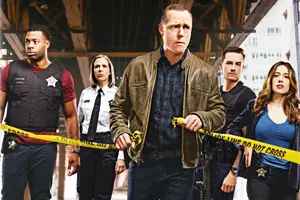TV is deluged with shows prioritizing the police point of view
-

The killing of George Floyd and the resulting protests have painted a negative image of law enforcement over the past week, yet TV portrayals of police have been overwhelmingly positive. "TV has long had a police’s-eye perspective that helps shape the way viewers see the world, prioritizing the victories and struggles of police over communities being policed," says Kathryn VanArendonk. "Order, a police imposed status quo, is good; disruption is bad. There are many, many reasons why a cop’s point of view has become the default way to frame national unrest, including institutional and systemic racism, the capitalist urge to prioritize property over human life, and a political system that benefits those already in power. But TV plays a role, too. The overwhelming mountain of cop shows amounts to a decades-long cultural education in who deserves attention, and whose perspective counts most. In stories of American crime, TV teaches us that cops are the characters we should care about." From Blue Bloods to S.W.A.T. to The Rookie to Law & Order: SVU to Chicago P.D. and the NCIS shows, network TV is filled with shows that "share a fundamental ideology: The cops are the protagonists," says VanArendonk. And it's not just network TV. Cable networks from Pop TV to WE TV to USA and Ion air hours upon hours of past and present cop shows, including Criminal Minds and CSI. Few shows, such as The Wire and Orange Is the New Black and The Shield, have offered negative portrayals of law enforcement. "The ramifications of putting cops at the center of the story is starkest on procedurals," says VanArendonk. "Every week, these series churn through crimes to solve; new victims and suspects arrive, and every week they leave again when their problem has been solved and order restored. The characters who stay are cops. In the almost unimaginable deluge of American crime TV, the characters whose names we know and whose lives we value are cops. The communities they police are disposable, and at the end of each episode, they’re promptly disposed of. Cop shows, regardless of whether they’re procedurals, also diminish the threat and shock of actual police violence. Their ubiquity makes it too easy for some audiences to ignore how TV’s police-centric worldview has calcified."
ALSO:
- A Color of Change study released in January detailed how crime shows are essentially pro-police propaganda: “Black people suffer greatly from the messages put out by the Crime TV genre and it’s far time for it to be taken into account,” said Rashad Robinson, president of Color of Change. “Seeing President Trump tweet ‘Law & Order’ was a sick irony, because not only are law and order policies disastrous, but the program, and ones like it, are worsening conditions for black people. Our research has shown how the crime TV genre creates and advances distorted representations of crime, justice, race and gender in media and culture, while glamorizing police. The past week makes clear how disastrous and deadly the consequences are.”
- S.W.A.T. producers say they are "frustrated, angry, but determined to do better. On-screen and off" in wake of George Floyd protests
- Law & Order: SVU star Ice-T responds to President Trump's "LAW & ORDER" tweet: "This MF......."
TOPICS: Chicago P.D., Law & Order, Law & Order: Special Victims Unit, NCIS, S.W.A.T., Dick Wolf, George Floyd, Ice-T, Black Lives Matter, Color of Change, TV Studies
More Chicago P.D. on Primetimer:- What role did Peter Greene play in Chicago P.D.? Everything to know about his character
- What happened to Mouse on Chicago P.D.? Character’s fate explained
- How to watch Chicago P.D. online? Streaming options explained
- What role did Markie Post play on Chicago P.D.? Everything to know about her character
